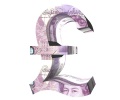

Sterling edged up against the dollar and euro on Monday, after data over the weekend showed a fall in COVID-19 cases in Britain but experts warned the full impact of the economy’s reopening on infection rates remained to be seen.
The pound has held up better than most major currencies in recent weeks, supported by Britain’s high vaccination rate at a time when the Delta variant has caused cases to surge worldwide.
The pound was the second-best performing G10 currency over the previous week’s 5-day trading period.
On the day it hit a 10-day high versus the dollar, up a third of a percent at $1.37970, its strongest since July 16.
It was last up 0.1% against the euro, at 85.50 pence.
Data the previous day showed new COVID-19 cases in Britain had fallen for five consecutive days for the first time since February, although officials have been cautious over whether this is a trend.
Analysts noted the data does not yet reflect the removal of most restrictions on July 19, while hundreds of thousands of people have been self-isolating after being warned to stay at home by the coronavirus app to prevent contagion.
“If we do not get any notable pick-up in infections over the coming days, market participants are likely to conclude that the UK government’s strategy is working and that this strategy could be replicated in other countries with higher vaccination rates,” currency analysts at MUFG said in a note.
“It could well help support risk sentiment through a period that tends to be a period of fragile risk appetite.”
In broader currency markets, the dollar dipped against major currencies as investor focus turned to this week’s meeting of the U.S. Federal Reserve. The Bank of England is scheduled to meet next week.
Source: Reuters (Reporting by Iain Withers; Editing by Kevin Liffey)